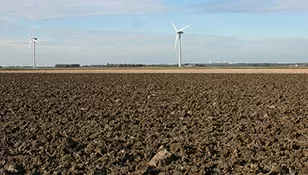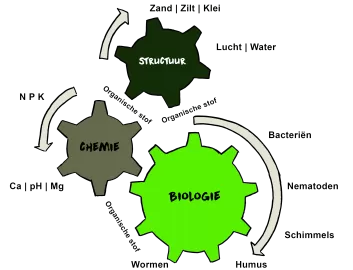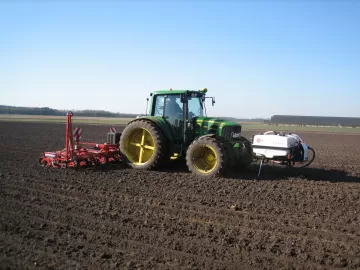Vision on Soilfertility
“The soil is the ‘creative material’ of most of the basic needs of life. Creation starts with a handful of dust.”
Dr William A. Albrecht, soil researcher, 100 years ago.
Fertilisation is creating optimum conditions for the soil following which the crop can grow on the basis of natural principles. Tweaking those processes is the art of 'fertilisation'!
One of the important natural rules of the soil we need to consider is the correct chemical balance of soil, as this provides an optimum structure enabling biology to run its course! This soil rule works in exactly that order!

Awareness
The first step towards improving soil fertility is awareness and everybody has to become aware of the problems in the soil. Our soil no longer works as it was intended; it is unhealthy and the yields are too small. How do we ensure a healthy soil and a fertile result?
A fertile soil where natural processes do what they should do requires attention to a number of different issues:
- A different input to increase the yields;
- By improving the quality of the 'end product', which requires a look at the content of the processes;
- We enhance crop resistance;
- With nutrition that contributes more than chemical pesticides;
- and contributes to sustainable soil use.
Soil fertility
Soil fertility is the interplay of many different factors. It can be compared to the cogs in an engine. We distinguish three cogs - biology, chemistry and structure (physiology). The biology cog is the largest and most important and is driven by chemical and physical properties (cogs). Every cog has its own unique characteristics. They enhance each other, but at the same time the weakest link determines the strength of the whole unit. We can also compare the organic-matter levels to the lubricant in the engine. "Have you checked your oil? In other words, what is the optimum performance level of that engine?".
Like all cycles, the soil cycle is about balance and the main challenge is how to restore and retain that balance. Which supplements are required? This is highly relevant when you consider that soil is the most important production factor on a farm.


The role of fertiliser
Over the last 50 years, mineral fertilisers have had a major influence on the development or perhaps we should say the destruction of our soils. Excessive work with the same salts time and again harms soil life and disrupts soil fertility. It has produced higher quantitative yields, but at the same time their quality deteriorated. The land has become marginal and has been exhausted. Even with continuous supplements, the soil only provides a fraction of its possible yield and time has come to restore the soil balance. We need to cherish our soil and ensure that natural processes are able to fulfil their purpose - stimulating soil life.

